The Colombian president’s first year in five photos: A journey from optimism to pessimism
Gustavo Petro is struggling to recover political momentum after 12 months in power. Meanwhile, conflicts among members of his inner-circle — along with his son’s arrest — are weighing down on his administration
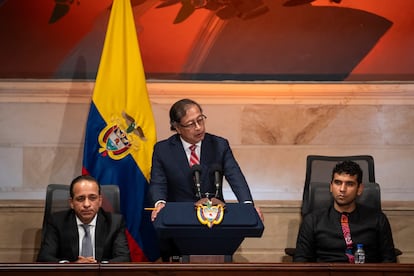
Perhaps it seems a long time ago, but just a year ago, about 56% of Colombians were optimistic about the presidency of Gustavo Petro. But a year later, 59% feel pessimistic, according to public opinion surveys.
During his governing “honeymoon,” Petro managed to push through progressive tax reform, restore diplomatic relations with Venezuela and sit down to talk cordially (and make alliances) with former political enemies. The project for change seemed to be chugging along smoothly… until, six months in, the road got bogged down. Petro’s proposal for “total peace” couldn’t get off the ground; the governmental coalition fell apart in the face of a controversial health reform, while statements made by former allies — including the president’s son — wounded the government badly.
The conciliatory Petro — who once called for political unity — gradually was replaced by a more confrontational one. He’s been calling for demonstrations to force Congress to approve his reforms, while engaging in mud-slinging with the Attorney General and the media. On Monday — the first year anniversary of his swearing-in — he kicked off a key week in his struggle to recover political momentum. Meanwhile, conflicts among members of his inner-circle — as well as the arrest of his son — are weighing down on his administration.
Here are five photos that exemplify the optimism that greeted Petro when he bega and the free fall towards pessimism that now engulfs the country.
The calming presence of economist José Antonio Ocampo
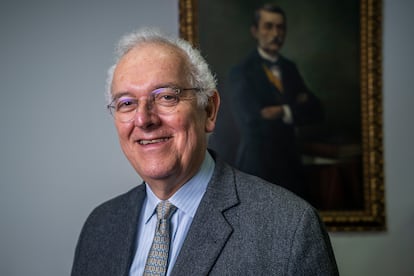
After being elected, many were nervous that Colombia’s first left-wing government would rattle the economy. Businesspeople and politicians begged the president to think through his decisions, so as to calm the jittery markets. Petro listened to this anxiety: he named José Antonio Ocampo to be his minister of finance — an internationally respected economist with social democratic leanings.
“He’s a serious person, a person who inspires confidence,” said the president of the National Association of Entrepreneurs — Colombia’s largest business union. Ocampo presented a tax reform on August 8 of 2022, the administration’s first full day in power. The ruling coalition in Congress approved it in just three months — an unprecedented record. This progressive reform increased taxes on the richest citizens and industries — especially the oil sector — and began filling state coffers to finance social reforms.
Ocampo remained calm in the face of inflation and the peso’s decline. Even when Minister of Mines Irene Vélez spoke of stopping new exploration contracts, the business community took solace in Ocampo, the “responsible adult” of finance, as they called him.
“I managed to lower interest rates on public debt [in pesos by almost four percentage points,” he told EL PAÍS, when he left the cabinet in May. His successor — Ricardo Bonilla — continued to cultivate the fiscal stability that Ocampo established.
A new relationship with Venezuela and the United States
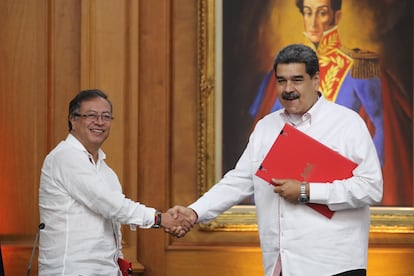
In his early days in power, Petro restored relations with Nicolás Maduro’s Venezuela. The two governments had cut off bilateral meetings for six years. Since this initial truce, Petro and Maduro have met several times and have agreed, for example, that Colombian investigative teams can search for the remains of people disappeared by paramilitary groups in Venezuela. Maduro’s government also agreed to be involved in Petro’s peace talks with the ELN — an armed group that operates, in part, on Venezuelan territory.
The two countries benefited economically when they reopened trade on the long border they share. And, for those who feared that the president’s ideology and his long relationship with the Chavista regime could interfere with Colombia’s harmony towards its greatest ally — the United States — Petro has actually been a faithful intermediary between his North American friend and Maduro.
This past April, Petro met with President Joe Biden and reiterated that an urgent change is needed in how the war on drugs is approached. While the Biden administration isn’t going to reverse the policy for now, this difference of opinion didn’t become a matter of dispute: the leaders agreed to cooperate on the protection of the environment and, in particular, the Amazon. “I hope that we can deepen mutual cooperation,” Biden said after the meeting. A short time later, one of the great achievements that Petro was able to present was a considerable drop in deforestation: 29% fewer hectares of Colombian forests were cleared in 2022 than in 2021.
The contentious healthcare reform
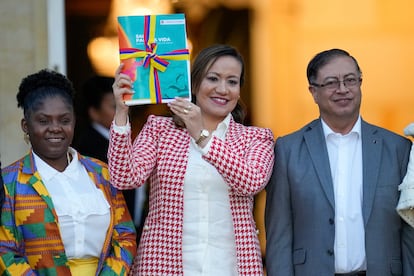
The illusion of unity began to crack in February of this year, when the president presented his healthcare reform. Several of his ministers resigned in protest. It was anticipated that the proposal would generate deep divisions in the cabinet, where two visions were at odds: that of Minister of Health Carolina Corcho, who defended the elimination of the EPS (Health Provider Companies), to be replaced by a public insurer; and that of the former Minister of Health Alejandro Gaviria, who was moved to the Education portfolio, but opposed the elimination of the EPS due to the inefficiency it could generate.
Little by little, the initiative fractured the governing coalition in Congress: conservatives, liberals and members of the centrist Union Party rebelled. So far, the reform has only managed to make it through one of four legislative debates. Petro first asked Gaviria to resign, due to his opposition to the reform. But two months later, Corcho — due to the resistance she faced — was also forced to leave her post. José Antonio Ocampo and Cecilia López also left, in part due to their criticism of the health reform. Petro ultimately had to remove 11 of his initial 18 ministers — an unusual occurrence for a president in his first year in power.
Amidst this governmental instability, the president ended up asking the citizens — not the congresspeople — to save his social reforms. He called for marches in May and June, when bi-partisanship hit rock bottom.
“We demand that the reforms that Colombia approved at the polls be enacted!” he yelled at a rally in May, while surrounded by a crowd of supporters near the Plaza de Bolívar. So far, not one of his three major social reforms — in the fields of health, labor and pensions — has been approved.
The strongest blows come from those closest to us: from Benedetti to Nicolás
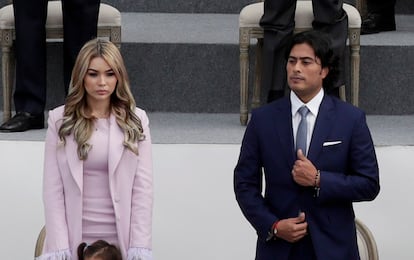
If something has worked in Petro’s favor in his first year in office, it’s that he hasn’t had to face a strong opposition leader. He maintains a cordial relationship with former right-wing president Álvaro Uribe and finalized an agreement to buy fertile land from ranchers, who feared that their property would be expropriated. Meanwhile, businessman Rodolfo Hernández — the man who almost defeated him in the 2022 runoff election — is being investigated for corruption and was forced to resign from his senate seat.
While the hardest political blows the president has received haven’t come from his enemies, he’s been battered by those closest to him. Armando Benedetti — his former campaign manager and ambassador to Venezuela — and his eldest son, Nicolás Petro, have both been embroiled in scandals. Via leaked audios, Benedetti — who was having an angry phone call with Laura Sarabia, the president’s former chief of staff — is heard saying that Petro’s 2022 presidential campaign received more money than it reported. Furious about being removed from the president’s inner-circle, Benedetti threatened Sarabia, reminding her that it was he who had obtained the 15 billion pesos ($3.7 million) for the campaign: “The minute I say who [donated the money], it’s f**cking over,” he snarled.
The audios not only indicate a violation of campaign finance law, as Colombia has a spending cap on how much each candidate can spend: they also allude to the criminal investigation into former president Ernesto Samper (1994-1998), who allegedly received campaign donations from the Cali Cartel.
Meanwhile, Nicolás Petro — who was arrested in a money-laundering probe — told the attorney general’s office last week that money entered his father’s campaign illegally.
Petro’s first-born decided to speak after his ex-partner — Days Vásquez — accused him of receiving and keeping millions of dollars from an ex-narco and other “donors.” The first time the president addressed this issue, back in March, he distanced himself from his son: “I didn’t raise him,” Petro sniffed. Now, the son has accused the father, opening up one of the most difficult political scandals that the government has faced.
From Operation Hope to Partial Peace
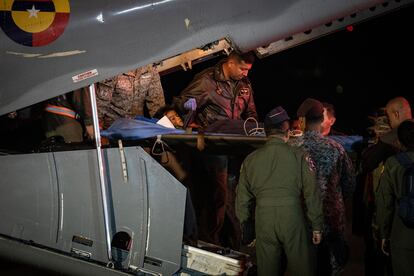
For the first time, an ex-guerrilla is governing Colombia. In his commitment to end the war, he has tried to offer the Armed Forces — the same forces he once fought — a new approach.
His moment of glory came when he successfully brokered an alliance between the Army and Indigenous groups to search — for more than 40 days — for four children lost in the Amazon jungle. This ultimately resulted in a success story, with major production companies now fighting for the film rights.
Petro — rather than trying to bolster the war effort — has been proposing a policy of “total peace” from day one. Rather than fighting them, he has made it clear that he wants to bring the armed groups to the table. Total peace, however, still hasn’t come into effect. The president hastily announced a ceasefire with several armed groups on January 1, but the armistice never materialized. The ELN quickly came out to deny it — a setback that left the impression that the country is depending more on the president’s impulses rather than on a serious policy of public safety.
While the peace process hasn’t collapsed, it’s advancing at a snail’s pace. A ceasefire has finally been formalized with the ELN, while discussions are slowly progressing with the FARC dissidents or urban gangs, such as the Shottas and the Spartans in the town of Buenaventura.
Peace takes time: the negotiation between Juan Manuel Santos’ administration (2010-2018) and the FARC took almost six years. The way things are going — with only three years left in his term — the goal of total peace still seems very elusive for President Petro.
Sign up for our weekly newsletter to get more English-language news coverage from EL PAÍS USA Edition
Tu suscripción se está usando en otro dispositivo
¿Quieres añadir otro usuario a tu suscripción?
Si continúas leyendo en este dispositivo, no se podrá leer en el otro.
FlechaTu suscripción se está usando en otro dispositivo y solo puedes acceder a EL PAÍS desde un dispositivo a la vez.
Si quieres compartir tu cuenta, cambia tu suscripción a la modalidad Premium, así podrás añadir otro usuario. Cada uno accederá con su propia cuenta de email, lo que os permitirá personalizar vuestra experiencia en EL PAÍS.
¿Tienes una suscripción de empresa? Accede aquí para contratar más cuentas.
En el caso de no saber quién está usando tu cuenta, te recomendamos cambiar tu contraseña aquí.
Si decides continuar compartiendo tu cuenta, este mensaje se mostrará en tu dispositivo y en el de la otra persona que está usando tu cuenta de forma indefinida, afectando a tu experiencia de lectura. Puedes consultar aquí los términos y condiciones de la suscripción digital.









































